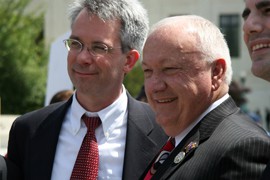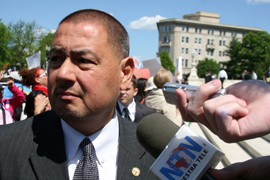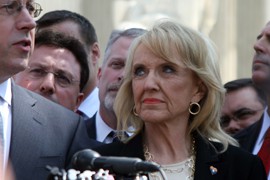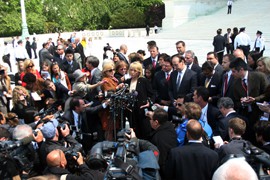Cronkite News has moved to a new home at cronkitenews.azpbs.org. Use this site to search archives from 2011 to May 2015. You can search the new site for current stories.
Justices appear skeptical of SB 1070 challenge during Supreme Court hearing
WASHINGTON – Supporters of Arizona’s SB 1070 were buoyed Wednesday after a U.S. Supreme Court hearing in which most justices appeared skeptical of the federal challenge to central parts of the immigration law.
Most of the debate focused on the law’s requirement that Arizona police check the immigration status of people during routine stops, and whether that is an unlawful pre-emption of federal authority or the state helping enforce federal law.
Gov. Jan Brewer and former state Sen. Russell Pearce, the bill’s architect, both expressed confidence the court will uphold some, if not all, of the law.
“The hearing went very, very, very well,” Brewer said outside the court building. “I feel very confident as I walked out of there that we will get a favorable ruling in late June.”
Pearce characterized the hearing afterward as “just awesome.”
The 2010 law makes it a state crime to be in the country illegally. It requires that police check immigration status if they have reasonable suspicion to believe someone is here illegally.
Similar laws have since passed in a handful of states.
But a federal judge blocked parts of Arizona’s law after the Justice Department sued, claiming the state was trampling on federal authority to regulate immigration.
Solicitor General Donald Verrilli, who argued the Justice Department’s case Wednesday, appeared to have a hard time convincing the court Arizona was unlawfully trying to enforce federal immigration policy.
“It (S.B. 1070) is not an effort to enforce federal law. It is an effort to let you know about violations of federal law,” said Chief Justice John Roberts, who also made it clear the court was not reviewing concerns about racial profiling.
“It seems to me that the federal government just doesn’t want to know who is here illegally and who’s not,” Roberts said.
Verrilli seemed to struggle to convince even the court’s more liberal justices that the federal government has exclusive authority over immigration matters. Some noted that the checks required by SB 1070 are checks that police routinely make already.
“You can see it’s not selling very well,” Justice Sonia Sotomayor said to Verrilli. “Why don’t you try to come up with something else?”
Verrilli argued the Constitution gives the federal government exclusive authority over immigration because it can affect foreign relations, but the justices appeared skeptical of that reasoning, too.
“What does sovereignty mean if it does not include the ability to defend your borders?” Justice Antonin Scalia asked.
“What’s wrong about the states enforcing federal law?” Scalia asked. “There is a federal law against robbing federal banks. Can it be made a state crime to rob those banks? I think it is.”
Pearce, the Mesa Republican whose support of SB 1070 sparked his recall last year, said that “even the liberals thought their arguments were weak.”
He declared it “a great day for Arizona and a great day for America,” and reiterated his belief that SB 1070 is only doing the job the federal government has failed to do itself.
“We will not apologize for demanding our border is secure and our laws are enforced,” he said.
Even some opponents conceded Wednesday that the court might uphold the law.
State Sen. Steve Gallardo, D-Phoenix, admitted the court raised some “serious questions” about sections of SB 1070 and he said the federal government erred in not making racial profiling an element of its case.
“It’s hard to read some of the justices,” said Gallardo, a strident opponent of the law. “At the end of the day, regardless of what the court says, SB 1070 needs to be repealed.”
Rep. Raul Grijalva, D-Tucson, told hundreds of SB 1070 opponents after the hearing that the court has a “tremendous responsibility” in deciding the law’s fate.
“In times of crisis, this court has been a refuge for the American people and for decency, fair play and equality,” Grijalva said. “I hope that is the court we are going to hear from in the next few months.”
Some in the crowd, which erupted in cheers and began chanting ‘Si se peude!’ in response to Grijalva, began to boo moments later when Brewer came out to address the press.
Justice Elena Kagan, one of the court’s liberal justices, recused herself from the hearing. She had been involved with the case during her time as solicitor general in the Obama administration before being named to the bench.
A decision is expected this summer. In the event of a 4-4 split, the lower court ruling blocking portions of SB 1070 would stand.










